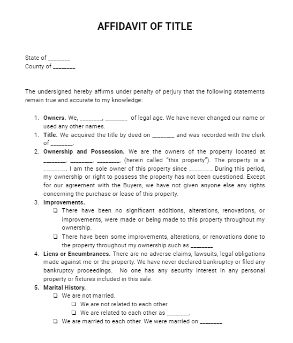- Eviction Notice Forms
- Power of Attorney Forms Forms
- Bill of Sale (Purchase Agreement) Forms
- Lease Agreement Forms
- Rental Application Forms
- Living Will Forms Forms
- Recommendation Letters Forms
- Resignation Letters Forms
- Release of Liability Agreement Forms
- Promissory Note Forms
- LLC Operating Agreement Forms
- Deed of Sale Forms
- Consent Form Forms
- Support Affidavit Forms
- Paternity Affidavit Forms
- Marital Affidavit Forms
- Financial Affidavit Forms
- Residential Affidavit Forms
- Affidavit of Identity Forms
- Affidavit of Title Forms
- Employment Affidavit Forms
- Affidavit of Loss Forms
- Gift Affidavit Forms
- Small Estate Affidavit Forms
- Service Affidavit Forms
- Heirship Affidavit Forms
- Survivorship Affidavit Forms
- Desistance Affidavit Forms
- Discrepancy Affidavit Forms
- Guardianship Affidavit Forms
- Undertaking Affidavit Forms
- General Affidavit Forms
- Affidavit of Death Forms
Affidavit of Title
Simply saying that you own a property without a title is akin to hearsay. But if you do have trouble locating the title of your property, you can opt to get an Affidavit of Title instead. This legal document can help you prove ownership of your land, real estate, and other properties such as stocks and bonds. Read More

What Is An Affidavit of Title?
An Affidavit of Title is a legal document that can help you prove that the property is actually yours. This document also serves as a formal declaration of your ownership to a certain land, real estate, vehicle, and other assets. As the rightful owner of the property, this document can give you an added reassurance of your claim as well as attest that the property and assets are not encumbered by liens, taxes, and easements. Moreover, aside from the affirmation of the legal ownership of the affiant to the property, the affidavit of title is also designed to protect the current and future owners of the property. This means that should there be any legal issues that would arise after the transaction, the affidavit of title can be used as evidence in court.
How To Write An Affidavit of Title In Five Steps
An affidavit of title is a formal document that attest to the status and facts about the property which includes ownership and possession, improvements, and any outstanding legal issues. For complicated transactions, consulting a lawyer is a wise thing to do. But you can already save some time, effort and resources if you create your own Affidavit of Title and just have it notarized. Follow these steps in drafting your own affidavit.
Specify the purpose of the Affidavit of Title
Most affidavits of title are created for the sole purpose of selling the property. Oftentimes, real estate transactions require an affidavit from the property owner attesting to their ownership and possession of the property. The Affidavit of of Title can be used for the following:
- Someone requested for a formal declaration of ownership and possession of a property
- Extra assurance that the owner is really the rightful owner of the property
- Making sure that the property has no current legal issues, liens, taxes, or easements.
Introduce the Affiant and write a statement of truth
The affidavit of title must identify who the Affiant is. The owner of the property is the only person ever allowed to make an affidavit of property that they own. So in this case, the affiant is the owner and seller of the property. Affiant should identify themselves with verifiable information such as their full legal name, date of birth, current address. A statement of truth should also be written to swear under oath that all facts presented in the affidavit are true.
Write verifiable statement of facts
Guidelines in writing an affidavit of title may vary from state to state. However, one general rule is that all statements must be true and correct. Aside from the Affiant’s personal information, other details must be included in the affidavit such as:
- Statement that says the affiant is the true and exclusive owner of the property, as well as the seller of the property indicated
- Type of property owned, its address, and a detailed description about it
- Legal status of the property such as liens or assessments outstanding against it
- Other specific inclusions unique to your situation or to the property
Review your affidavit before signing in front of a notary
Once you’re done writing your affidavit, review all the details you included in it to catch erroneous statements and correct these mistakes. You may also have a lawyer or a trusted friend who is knowledgeable about your situation review your work. Since this is a sworn statement, you can be held accountable for misrepresentation and falsifying information. This is important so that you won’t be held liable for perjury.
Take it to the Notary for Signing
After working on your affidavit, you may bring it with you to the notary public or any officers of court who can administer an oath. Make sure that your document is not signed yet as it needs to be signed in their presence. This is their way to verify and attest to your identity. Once the notary has signed your document, it is now a notarized affidavit that is legal and admissible in court.
FAQs
Why should buyers always request for an Affidavit of Title?
As previously stated, an affidavit of title provides an added protection to buyers. This document shows the current status of the property for sale, gives assurance that the seller is really the owner of the property, and makes sure that the property does not have liens or encumbrances, or other major legal issues like claims from other parties.
Does the Affidavit of Title only refer to real estate properties?
Majority of affidavits of titles are for selling real estate properties but it isn’t the only property that can be covered by this document. Other assets such as a boat, car, stocks, and bond certificates can be covered by an affidavit of title to attest ownership and possession of these big ticket items.
Does an Affidavit of Title guarantee a free and clean title?
No, an affidavit of title does not ensure that the title is clean. Some property owners might not disclose that there are liens and encumbrances that are unrecorded or were mistakenly recorded for fraudulent activities.
Is it a concern if the seller of a property would not provide an Affidavit of Title?
There can be a number of reasons why owners or property sellers will not provide an affidavit of title. Some of these concerns include:
- They are not the actual owner of the property being sold.
- The co-owners of the property refuse to sell their part of the property.
- There are liens on the property
An Affidavit of title contains sworn statements that the owner and seller of a property hold the property’s title. It’s a legal proof of ownership and right to sell it. This also gives buyers extra legal protection against fraudulent activities as well as make sure that they are entering a legal transaction.
